How human sleep fundamentally changed
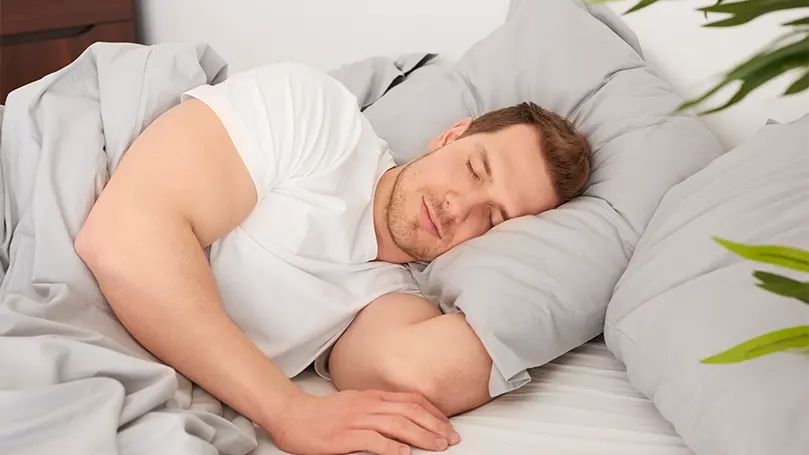
When it comes to how sleep quality changed over the past few decades, it's difficult to pull any exact numbers. This is because on a cultural level, talking about sleep deprivation and sleep hygiene (or the lack thereof) has been seen as taboo until recent years.
However, we can observe a fundamental change in human sleep thanks to written records. Namely, our sleep cycles used to look quite different – with the biphasic sleep module being described as early as Virgil's Aeneid.
Biphasic sleep might seem alien to the modern person, as it splits the sleeping period into two distinct halves – with one usually occurring during midday and the other at night. Although this timing can vary depending on the epoch and culture.
However, we can observe a shift towards monophasic sleep during the Industrial Revolution. This was likely due to the fact that work was more consistent, leaving less time for leisure, and the introduction of artificial light in most homes. This meant that two sleep periods were harder to fit into the predetermined schedule and people started going to bed later at night.
The Sleeping Habits Of Current Preindustrial Cultures
Another interesting point of reference to how technology can potentially affect sleep can be seen when looking at current preindustrial cultures. Two observations in particular contrast what many have assumed about preindustrial sleeping patterns.
Firstly, the observed tribes, the Hadza of Tanzania, the San of Namibia, and the Tsimane of Bolivia, didn't have a longer sleep duration than the average person – with an average of 5.7 to 7.1 hours depending on the season.
Secondly, they did not go to sleep as soon as the sun went down, usually staying up for approximately 3 more hours. This contradicts the notion that technology use is the sole reason we stay up after sundown. However, this study and its implications have seen pushback from the scientific community. You can read the coverage of the article here as well as our own article on the history of human sleep.
How screen time affects sleep quality
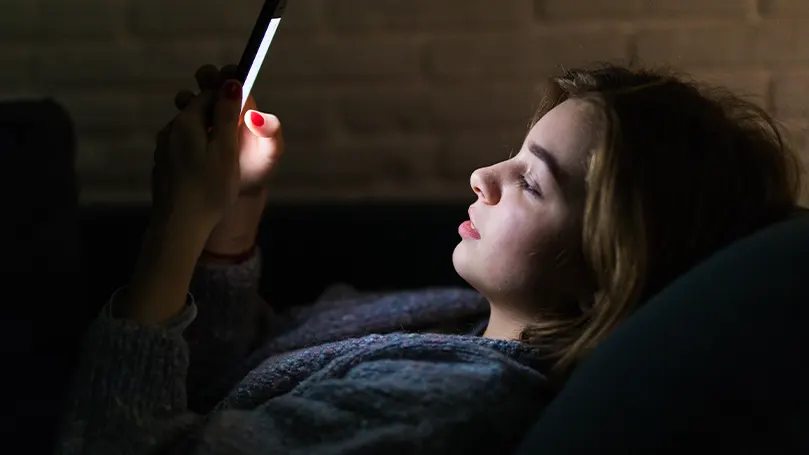
A very popular notion, even outside of scientific circles, is the connection between sleep problems and the usage of electronic devices before bed. On a physical level, this is because the light coming off most electronic devices is known as shortwave light or blue light. We've also published an article on the topic of blue light and its effects on sleep.
It has been observed that blue light affects our circadian rhythm through the process of melatonin suppression. What this means in practice is that we don't feel sleepy even when we probably should. And this effect seems exceptionally potent in children, with them being more sensitive to low, moderate and bright light exposure.
Across most studies, screen time of any type (with phones, computers and televisions being the most prominent) seems to have a negative effect on sleep latency (how long it takes you to fall asleep), and REM sleep duration, as well as heightening the chance for nighttime disturbances and even nightmares.
In fact, one study in particular even found a correlation between frequent listening to music and the presence of nightmares. However, in these studies, it's worth pointing out that the actual content displayed can likely be the culprit (or in the case of music, the lyrics, melody, etc). So, on a physical level, all we can say for certain is that the melatonin suppression caused by blue light emission can potentially create unhealthy sleep patterns.
How the internet affects our mental health and sleep
Now that we've covered how newer technology can affect the user on a physical level (via the blue light emitted from your computer or cell phone), we'd like to observe the other major category – one's mental health. More precisely, how using the internet for prolonged periods of time can affect the user.
First off, to contextualize this discussion, we'd like to point out one rather important factor. According to many prominent publishers and institutions, in this case we're going to mostly lean on this study done by Cambridge, Internet Addiction is comparable to substance abuse. We'd like to highlight this fact as some might not fully realise the scope and potential adverse effects Internet Addiction can have. In fact, symptoms commonly understood when talking about substance abuse (such as craving, tolerance, withdrawal, and salience) are even listed as key points for the assessment of Internet Addiction.
Now that we hopefully have the general scale in check, we'd like to talk about specific connections that have or can be made between excessive internet usage and sleep health.
Higher Chances Of Loneliness
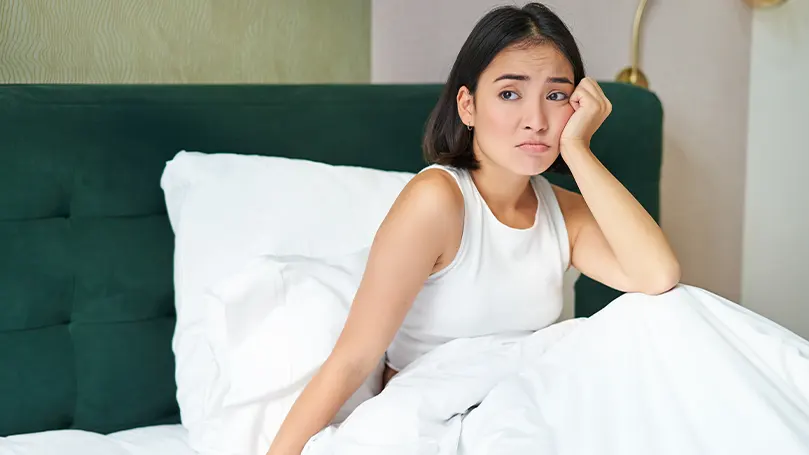
Although this factor might seem odd to some on a subjective level (a point we will discuss later on), there does seem to be a strong correlation between loneliness and Internet Addiction. Since there's a lot of research on the topic, we'll focus on this meta-analysis from the National Library of Medicine as our focal point.
The meta-analysis looked over many studies, systematically emitting all those that did not meet their precise criteria, and the research suggests a strong connection between Internet Addiction and loneliness. We can then in turn connect loneliness to a wider slew of potential sleep problems and poorer sleep quality.
This is because our mental health can directly or indirectly affect our sleep health. On a physical level, heightened cortisol levels can disrupt our regular melatonin levels and thus cause difficulty falling asleep. And if progressed to a sense of depression, the afflicted person can also suffer from certain sleep disorders.
According to a UK study, 83% of depressed patients showed at least one symptom of insomnia. So, factors such as a short sleep duration, nighttime disturbances, and insufficient sleep as a whole can likely occur in tandem with a heightened feeling of loneliness.
There are also internet-adjacent issues that give more context. Namely, the correlation between social media and depression (which we will discuss shortly), video games and violence (although this thesis isn't backed by most credible sources), and in recent years, the shortening of our attention span. While not all scientifically backed, these common fields of interest do showcase a level of alarm when it comes to young adults and the influence new technologies might have on them.
Social Media And Depression
When it comes to the relationship between social media and mental health, there are many factors to consider. For the purposes of this article, we're first going to talk about the more troubling implications and leave the counterarguments in the final section.
Even without going into strictly empirical evidence, we believe many are aware of the influence cell phones and social media have had. We're more connected than ever but many also point to a high level of vanity that is present online. And in more extreme cases, we've seen how cyberbullying in particular can devastate a person's life.
And according to a 2019 meta-analysis, there does seem to be a general correlation between depression and the use of social media. One of the more important factors in this department is social comparison theory – the practice of comparing yourself to others. As one could imagine, this form of comparison became a lot easier with social media. And with the rise of influencers, one's virtual persona came to be very stylized and idealized – commonly showcasing the person's wealth or unattainable lifestyle.
How sleep aids and other medications affect our sleep
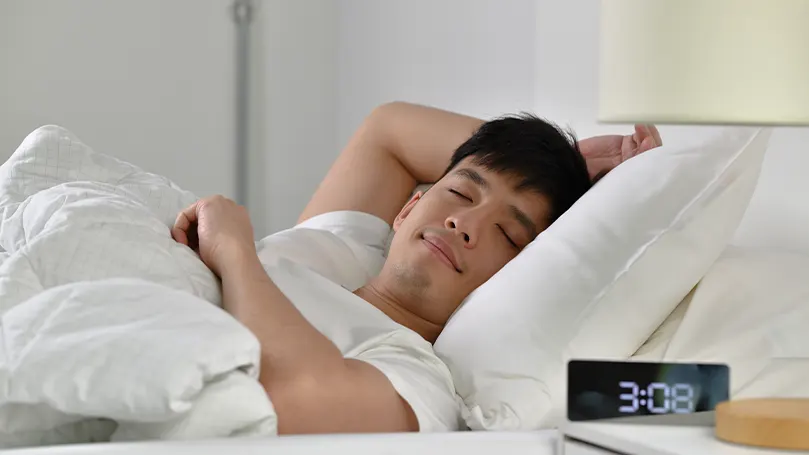
When talking about new technology, most people default to computers, cell phones, and other devices with screens. However, another aspect of developed technology is the strides made in the area of medicine. By and large, sleep medicine helps people suffering from sleep disorders get some rest and tackle other adjacent disorders.
However, we thought it's worth mentioning that improper use of over-the-counter or even prescribed medications can also have adverse effects on your sleep quality. Referring to the Cleveland Clinic, certain sleep medications can cause addiction and bring about difficulty maintaining sleep. This is mostly the case with rebound insomnia as well as the emergence of parasomnias in certain situations.
And if we also factor in cases where people take sleep medicine as well as other sedatives (such as alcohol), developing a sleep disorder isn't out of the question. And cases of excessive daytime sleepiness, sleepwaking, and other unwanted sleep habits have been observed. All of that being said, all of these risks aren't nearly as common when there's a sleep doctor present and proper measures are put in place.
Indirect ways modern technology affects our sleep
Now that we've covered the many ways technology use can affect sleep directly, we'd like to discuss a few effects that might not be as obvious at first glance. Of course, all of these factors can exist independently of newer technologies, however, we believe there is a strong case to be made about their involvement.
We're Less Active
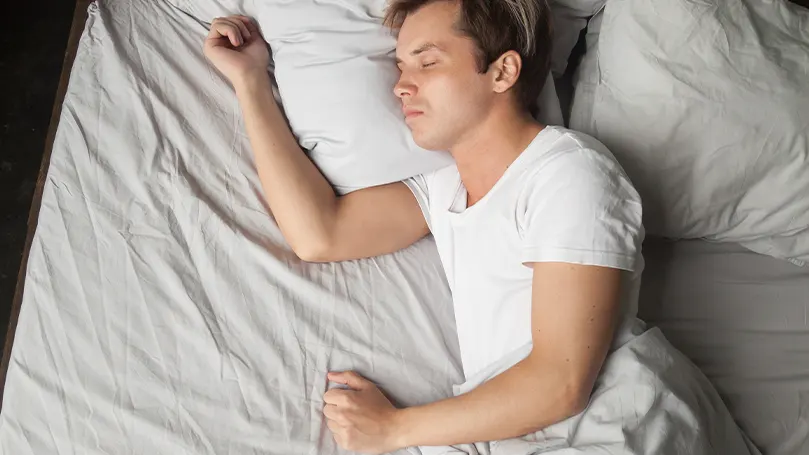
One of the main goals of technological advancement is to make our lives easier. However, this also often leads to added free time and leisure. And while you can use this excess time in order to work out, run, swim, or participate in other physical activities, a significant amount of people prefer to stay inside, watching movies or playing video games.
According to the World Health Organisation, 1 in 3 women and 1 in 4 men do not exert themselves enough to be considered healthy. And this is especially noticeable in high-income countries. Due to factors like passive modes of transportation, an abundance of online entertainment, and in recent years remote work from home, it's easy to see why we've become less active overall.
And with less activity come many other complications that can trickle down to your sleep quality. For example, living a completely sedentary lifestyle can cause weight gain and potentially even diabetes – both of which can then affect conditions like sleep apnea. However, as with the other segments so far, we'll be sure to provide the opposite viewpoint later on as well.
Hustle Culture
Although we've already covered the relationship between social media and mental health, we'd like to specifically look at how the working environment has changed in the past few years. In particular, we'd like to refer to what is known as “hustle culture”.
The sentiment of “I'll sleep when I'm dead” seems to be rather common in online discourse, as successful people such as Elon Musk champion this approach. People are encouraged to work until they drop, and even teens are told that they can become millionaires online if they put the effort in. Of course, for some, this is a positive trait as it fosters ambition.
However, this kind of mindset also leads many to pull all-nighters, commonly ruining their sleep schedule. We've even seen entire industries practice this mentality, most notably animation and video game production studios, where it's commonly referred to as “the crunch”.
Overindulgence In Food And Drink
Lastly, we'd like to talk about how the advancement of technology has made our diets less sleep-friendly. And this is mostly due to two main, intertwining factors: the dominance of heavily-processed food and an alarming sugar spike.
Speaking of the former, recent coverage of an experiment showed that up to 60% of an American's diet is made up of “ultra-processed” foods, while vegetables only make up around 1%. And this is rather significant as this approach to nutrition typically leads to a much larger calorie count while also providing fewer macronutrients than can be found in organic produce.
This, alongside the sedentary lifestyle we've already covered, only increases the chances of weight gain and obesity. Furthermore, these ultra-processed foods typically also contain a lot of fat and an even larger amount of sugar. In the latter case, it's even estimated that a baby in America consumes more sugar than the recommended amount for adults.
And even beyond weight gain and the risk of diabetes, these two factors can disrupt sleep. Fatty foods can make digestion more difficult, sometimes causing issues when eaten late at night, and sugar can make us feel more energetic, making falling asleep more difficult.
Can technology help us get better sleep?
Now that we've covered the many ways in which technological advancements can hamper proper sleep quality, we'd like to look at the other side of the coin. As mentioned in the opening section, the relationship between sleep and technology use isn't purely negative nor is it straightforward. So, here are a few ways in which technology helped people sleep better than before.
More Comfort Than Ever Before
If we narrow our discussion to just the mattress/bedding industry, we'd say that technology has done wonders for sleep. For example, if you were to look at the history of pillows, you'd see that comfort played a very little part when it came to design. For most people, stone and wood were the only options and even the rich sometimes overlooked comfort in favour of appearances.
However, in the modern era, bedding has become incredibly comfortable even at the lowest price points. Even something like memory foam, which was originally designed for astronauts, is now rather frequent in people's homes. For example, in the US alone, the memory foam pillow and mattress business is estimated at 8 billion dollars in 2023. Hopefully, this showcases how easily-accessible comfortable bedding has become.
The Perfect Sleeping Conditions For Everyone
On a similar note to the previous section, bedding has also become a lot more tailor-made to fit our every need. While we can't claim that a person can always afford or have access to the bedding that suits them perfectly, it's safe to assume that it exists. And that's mostly due to the strides made in terms of the materials used and the new technologies that have been developed.
Hypoallergenic materials are extremely common now, meaning that people with allergies don't have to worry about flare-ups during the night. Sustainable materials such as bamboo or eucalyptus are also seeing more popularity, allowing environmentally-conscious people to get a peaceful night's rest. And more extravagant products, such as silk bedding, allow those with sensitive skin to sleep calmly.
On top of that, we now have mattresses at different firmness levels, adjustable bed frames, all-season duvets, spring-loaded toppers, and so much more. As we've stated, this phenomenon is closely related to why we are (or at least can be) more comfortable than ever before. And, of course, this in turn leads to much better sleep quality.
Treating Sleep Disorders
Sleep disorders by design hamper sleep and leave a lot of people with bags under their eyes. And according to the NHS, insomnia alone is likely to affect 1/3 of the UK population at some point in their lives. However, advancements in technology have made dealing with certain sleep disorders a lot easier than it has ever been!
Among the more obvious treatments, we have medication. From sedatives to antihistamines, there's a plethora of medications that can ease certain symptoms that come with sleep disorders. On top of that, practices such as Cognitive Behavioural Therapy have seen more use in recent times as well.
Lastly, certain treatment options were a lot more recent than one might think. For example, if you were suffering from Obstructive Sleep Apnea in the 70s, you likely had very limited options. But with the invention of the CPAP machine, millions of people now have a way to deal with this sleep disorder.
Tracking Sleep Quality
One of the factors that made sleep a tricky subject to tackle is that it's largely abstract. Before the invention of modern monitoring equipment, doctors had to rely on the patient's assessment of their sleep quality. But these days, anyone with a smartwatch can easily track their sleep quality.
With this one gadget, you can track your sleep patterns, your sleep latency, disturbances, and anything else that might interest you. And when we take that to a more professional level, like in sleep studies, doctors can have a very intricate and detailed overlook of all things sleep-related. So, being how knowledge is power, we'd say that we collectively became a lot more powerful.
Better Support/Community
While we talked in length about the feeling of loneliness that can be correlated with internet use, it's important to note that it isn't completely one-sided. And that's because it's now easier than ever to find a community with the same interests or struggles as you.
For example, if we just look at Reddit, there's at the time of writing this a community of over 400k people discussing sleep-related topics. And this means that it's now easier than ever to be informed and talk to people who have been in your shoes. Not to mention that there are now plenty of websites dedicated to informing their readers about all things sleep-related – like The Sleep Advisors.
Counteracting All The Negatives
Lastly, we'd like to discuss one important factor – that most if not all the negatives technology use causes can be fixed. And more often than not, these fixes also rely on technology.
For example, while we're undoubtedly less active than before, staying healthy can be quite easy. Standing desks can make sure you're not sitting all day. Stationary bikes can allow you to burn some calories. And even certain video games can help you stay active throughout the day (like VR games or Pokemon Go).
The same principle can be applied to most of the situations listed so far. While looking at a screen before bed is less than ideal, there are solutions – like night mode options, blue-light blockers, time-lock features, and so on. And this is a point we wanted to emphasise, as technology by itself isn't harmful to sleep but rather it can have adverse effects when used carelessly.
What are the next steps for sleep technology?
When all is said and done, the only question that remains is where sleep technology is going to go next. We've already covered how technology has influenced the mattress industry but that's only one piece of the puzzle. Ideally, we should see an improvement in all areas of sleep as technology and sleep become more intertwined.
On the most fundamental level, people will have access to a lot more information. And perhaps scientists could even figure out the endless mystery behind sleep as well. By this point, we're sure everyone is going to have a tech bedroom of some kind, with bedroom gadgets making sleep come as easily as possible. These smart bedrooms might, for example, have black-out curtains that move on their own, blue light filters on every screen, and mattresses that perfectly contort to your body.
Of course, these are just our predictions. In reality, it's rather difficult to gauge exactly how technology will affect sleep in the future. But we'd say it will be a net positive in the end, as long as we remain informed and diligent!
Spread the word
References & Resources
Recommended reading:

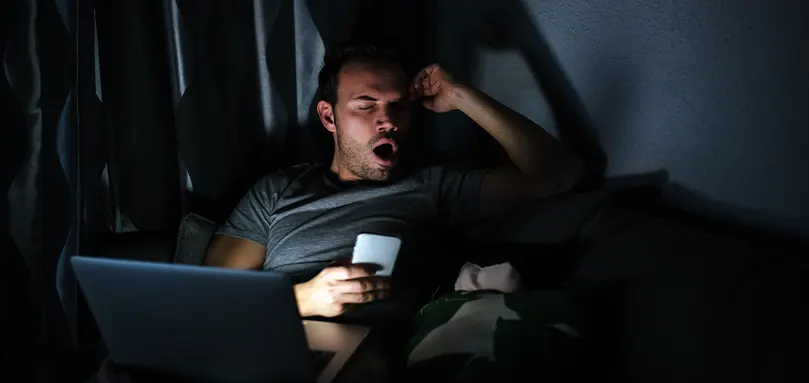












There are no comments yet
"*" indicates required fields